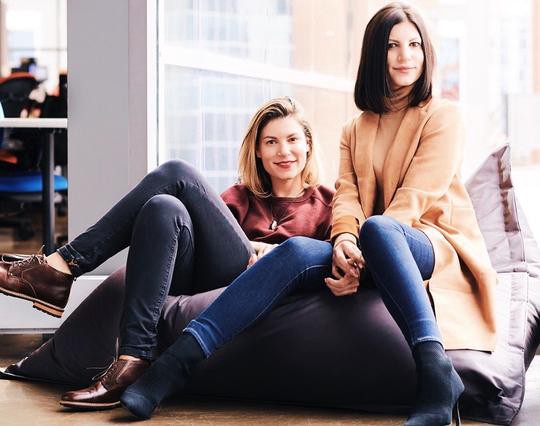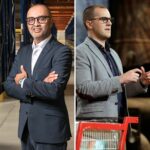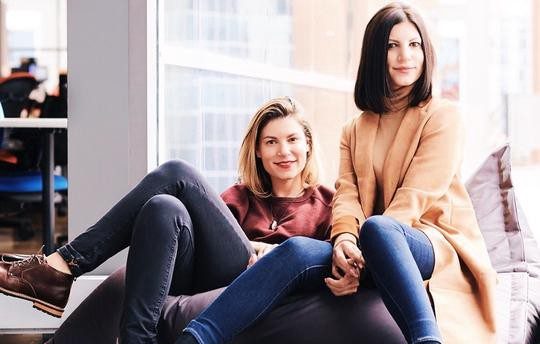BLOG
How to Navigate the Balance Between Sustainability and Profitability as a Startup
Written by Lindsay Lorusso, CEO & Co-founder of Nudnik, as heard on LaunchPod
Today, business needs to start from a place of sustainability. Consumer behaviour is starting to shift and brands have to catch up. The benefit of being an early or idea stage startup is that it allows you to get ahead of the curve and integrate sustainability into your business model from day one so that you can maintain profitability AND make impact. While scaling Nudnik, I learned how to navigate the balance between sustainability and profitability. Here are some crucial steps in that journey that will allow you to scale a sustainable venture and drive profit:
1. Define YOUR purpose
Pick something close to your heart and fight for it. There is no motivator more powerful than passion. For me, protecting the people on the planet and being able to be creative and create products or create experiences that ultimately don’t take away from the health of people or planet is exciting. Raising young kids in today’s world, where we’re inundated with climate change and climate action and don’t know what the future holds in terms of the planet’s health and our health as a species is scary. So, what drives me every day to not just be paralyzed in fear (“eco-anxiety” is a real thing!) is to be able to work on something that is giving back positively as well. If you’re driven by your purpose, chances are you’ll be more motivated to successfully scale your impact.
2. Find a BIG problem and validate it
When we started Nudnik, it was almost like a think tank — we identified textile waste as a solvable problem in the world of waste management and sought out the individuals on the front lines of the industry to validate and solve. We found that textile waste was very similar to plastic waste — it must be carefully sorted to be recycled. Different textile fibers must be separated, just like how different colours and grades of plastic must be. When you’re thinking globally, this becomes a huge challenge for recycling. There are so many different variations of fabric across the world; either you have a synthetic fabric or a natural fabric and those two separate fabrics need to be recycled differently. When you combine them, it makes it extremely difficult, if not impossible, to recycle. While working in the waste management industry, I had clients that were generating textile waste here in Toronto, and it was all going to landfill because it wasn’t able to be recycled.
 So, Nudnik started off as this idea between my twin sister and I, to solve this problem: How can we take this textile waste that can’t be recycled and turn it into something new?
So, Nudnik started off as this idea between my twin sister and I, to solve this problem: How can we take this textile waste that can’t be recycled and turn it into something new?
How can we give it a second life? From there, we worked with designers. We got their end of role materials. We worked with print shops that would give us t-shirts or sweatshirts that they’d misprinted that would have become waste. We were buying 100 pound bales of gently used adult sized t-shirts and sweatshirts, laying out our little pattern pieces on them and then cutting and assembling them into new garments. This whole process was using different forms of textile waste and turning it into collections. That initial experience showed us that people cared about what we were doing. They wanted to support us by buying our products. We met Jeanne Beker, we got into the Joe Fresh Center for Fashion Innovation… Our idea was timely and on the verge of being SUPER timely. That relevancy really propelled us to move forward with it.
We started to truly think about scale when I came into the Next Founders program in the summer of 2018. There, I had access to a room full of founders that had already established businesses that were getting to or already at specific scale and scaling even further than that. Being able to learn from these founders had a great impact on the way we pivoted our business model. Before this experience, we didn’t yet have a sustainable business model in terms of really moving that business forward in a global way. Turns out, this problem that we found, textile waste, is not exclusive to Canada. We started to look at textile waste in larger forms than our current outputs to be able to put out a product that was globally scalable.
3. Identify opportunities that allow you to grow. Think big!
The first opportunity we identified was off-cut fabrics. Off-cut fabrics are essentially the remnants of when pattern pieces are cut from stacks of fabric during large scale production. There are always gaps in that fabric and that fabric always ends up either in landfill or burned.
The fashion industry creates enough off-cut fabric or cutting waste annually to give every person on Earth 6 adult sized t shirts every year! That’s astronomical. Even if we get better with our post-consumer textile waste (by donating our clothes to keep them in rotation or buying secondhand to keep clothing out of landfills) and if we also minimize the pre-consumer end-of-roll textile waste there’s always going to be cutting waste because we’re still cutting from rows of fabric and our pattern pieces are all different shapes. There’s always going to be an excess of off-cut fabric. For us, that was the opportunity we leveraged to really create a product line that we could scale and continue to scale.
The second opportunity we identified was partnering with factories overseas. I mean, they have the problem, right? They’re either dealing with an environmental cost because they’re burning it or they’re dealing with a hefty disposal cost because it costs a lot to put fabric in the landfill. It’s very heavy. So we partner with factories now where we turn those off cut fabrics into our Nudnik pieces. Here, we help to solve their waste problem while having social impact. It’s a Win-Win for everybody.
You can make a social impact venture profitable if you’re intentional about your business model from the start. Build motivation by identifying a purpose for your venture that hits close to home, find a solvable problem within that purpose and jump on any opportunities that allow you to scale.
Learn more from Lindsay as she sits down with Jeanne Beker and the NEXT Canada team to talk about the art of entrepreneurship and sustainability on the NEXT Canada podcast, LaunchPod.



